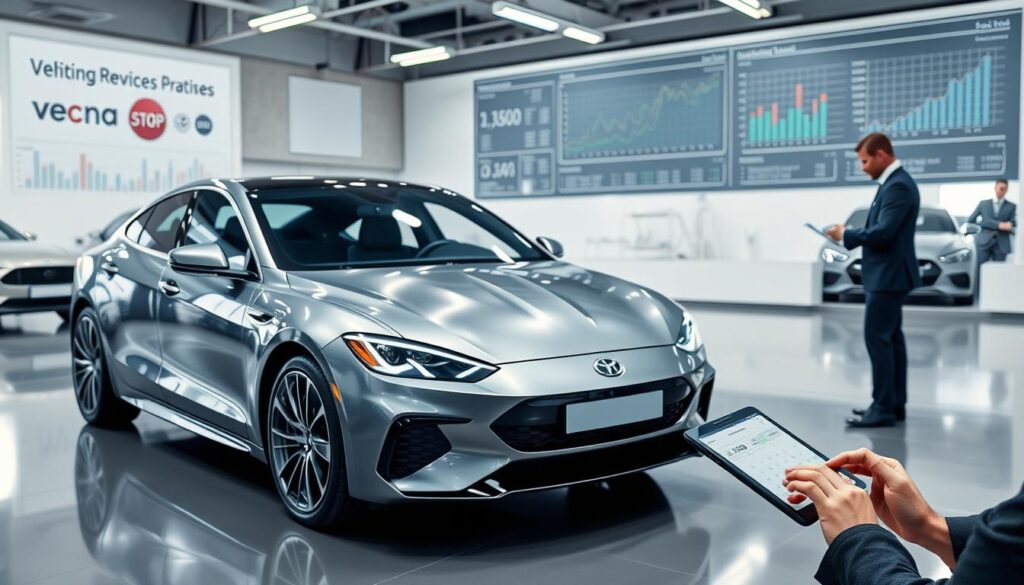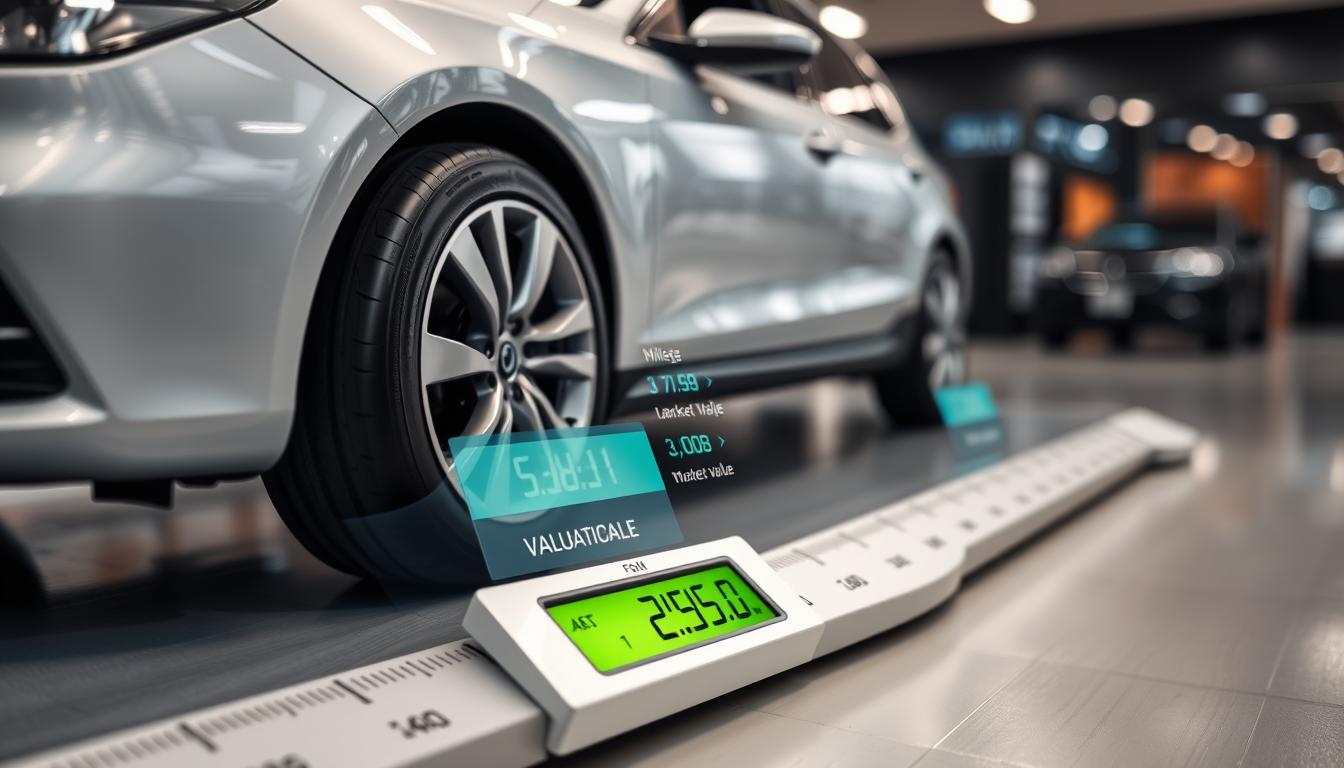Recent studies reveal that approximately 30% of car owners overestimate their vehicle’s worth when trading it in. This statistic underscores the paramount importance of precise car valuation. It not only determines the trade-in value but also ensures a fair and satisfactory transaction. Grasping the vehicle appraisal process can substantially reduce time and financial expenditure, making it imperative for both sellers and dealerships. This guide delves into the complexities of auto worth estimation, providing you with vital information to enhance your trade-in experience.
Key Takeaways
- Understanding car valuation can help ensure you receive an honest offer for your vehicle.
- Accurate valuations positively affect the trading process for both parties involved.
- Avoiding overestimations can save you from potential disappointments when trading in your car.
- Familiarity with the valuation process can lead to better negotiation outcomes.
- Researching your vehicle’s worth helps prepare you for discussions with dealerships.
Understanding Car Valuation: A Comprehensive Overview
In the realm of the automotive market, car valuation emerges as a pivotal process, aimed at determining the fair market value of a vehicle. This assessment is influenced by a multitude of factors, including the vehicle’s condition, prevailing market demand, and current trends. An accurate automobile value assessment is crucial, benefiting both potential buyers and sellers, as well as dealerships in managing their inventory effectively.
What is Car Valuation?
Car valuation encapsulates the precise determination of a vehicle’s worth. This intricate process involves a detailed examination of various car attributes, such as its age, mileage, and overall condition. The culmination of this analysis provides a comprehensive understanding of the vehicle’s market standing. For instance, standard guides and resources are instrumental in establishing a vehicle’s value, facilitating informed investment decisions. The utilization of diverse tools for car worth valuation enables users to attain a precise estimation.
Why is Car Valuation Important?
The significance of car valuation lies in its ability to empower both buyers and sellers in negotiations. Possessing knowledge of a vehicle’s worth grants individuals a more advantageous position in discussions regarding pricing. This advantage extends beyond private transactions; dealerships also benefit from accurate valuations, ensuring fair pricing structures. Access to reliable information fosters better decision-making. For a deeper understanding, refer to this resource on car value determination: understanding car value determination. This enhances the overall buying and selling experience, fostering balanced transactions within the market.
Key Factors Influencing Car Valuation
Grasping the variables that influence car valuation is crucial for securing a superior trade-in offer. The truck valuation or auto worth estimation hinges on several pivotal elements. These include the vehicle’s age, mileage, condition, and market demand.
Age of the Vehicle
The age of a vehicle is a primary determinant of its value. Typically, older cars command lower values due to depreciation. Significant depreciation occurs predominantly in the initial years of ownership. This pattern directly influences auto worth estimation, potentially leading to reduced trade-in offers for older models.
Mileage and Condition
Mileage is a significant factor in vehicle valuation. Vehicles with fewer miles are perceived as having less wear and tear, enhancing their appeal and value. Maintaining the vehicle in optimal condition—both mechanically and visually—contributes to a higher truck valuation. It is essential to document any service or repairs to assure potential buyers of the vehicle’s condition.
Market Demand
Market demand is another critical factor in vehicle valuation. Certain makes and models, due to their popularity, may retain their value longer. For example, popular SUVs or trucks often command better trade-in offers than lesser-known models. Understanding market trends is vital for making informed decisions regarding your vehicle’s auto worth estimation. For a deeper dive into the factors influencing car value, refer to this comprehensive guide.
How to Prepare for a Car Valuation
Optimizing your vehicle’s presentation for an appraisal can substantially elevate its perceived worth. The efficacy of a vehicle appraisal and a comprehensive automobile value assessment heavily hinges on the car’s condition and supporting documentation. Adherence to a few straightforward preparatory measures can significantly boost the prospects of securing a superior trade-in valuation.
Gather Necessary Documentation
Initiate the appraisal preparation by compiling critical documents that illuminate your vehicle’s past. Essential paperwork may encompass:
- Title of the vehicle
- Current registration
- Service records detailing maintenance and repairs
These documents serve as tangible evidence of your dedication to the vehicle’s upkeep. They instill confidence in appraisers regarding the car’s state, potentially leading to a more favorable valuation.
Ensure Your Car is Clean and Presentable
A vehicle in pristine condition can significantly influence the impression left during the assessment. Dedicate time to meticulously clean both the exterior and interior of the automobile. Focus on:
- Removing trash and clutter from the inside
- Cleaning the windows and mirrors
- Vacuuming and shampooing carpets and upholstery
Presenting your vehicle in optimal condition underscores its maintenance history. A well-kept car fosters increased confidence during negotiations, often culminating in a higher trade-in value.
Methods of Car Valuation
The exploration of car valuation methodologies unveils the intrinsic value of your automotive asset. Each technique boasts distinct merits, necessitating a multifaceted approach to ascertain the optimal valuation. Below, we delineate the prevalent methodologies employed for an accurate vehicle appraisal.
Online Valuation Tools
Online valuation tools furnish an initial estimate of your vehicle’s worth by scrutinizing inputs such as make, model, year, and condition. These digital instruments facilitate rapid assessment of value, obviating the need for expert consultation. Their accessibility from any location renders them an excellent initial step in comprehending your vehicle’s market standing. It is crucial to acknowledge that these tools might not fully capture the intricacies of your vehicle’s condition. Nonetheless, they offer a useful estimate for your motorcycle appraisal or car worth valuation.
Dealership Appraisals
Dealership appraisals entail an on-site evaluation conducted by their appraisal team. This approach considers the vehicle’s condition, prevailing market trends, and the dealership’s profit margins. Dealerships often adjust their offers based on their anticipated resale value, leading to trade-in values that may diverge from private sale prices. Grasping the dealership’s valuation process can significantly impact your negotiation tactics and expectations.
Professional Appraisers
Engaging a professional appraiser provides an unbiased and detailed valuation. These specialists employ established standards and methodologies to meticulously assess vehicles. A professional appraisal is indispensable in transactions, particularly when negotiating sales or trade-ins. Their expertise ensures an accurate valuation of your vehicle, coupled with insightful recommendations for enhancing its value for your motorcycle appraisal or car worth valuation.
Online Car Valuation Tools
Online resources are indispensable for those seeking an accurate vehicle appraisal. These tools offer critical insights into the auto worth estimation process. They significantly enhance one’s comprehension of their vehicle’s market value.
Popular Online Valuation Resources
Renowned online valuation platforms include Kelley Blue Book, Edmunds, and NADA Guides. Each platform provides extensive vehicle datasets and expert analysis. This facilitates users in accessing dependable information about their vehicles.
How to Use Online Tools Effectively
To maximize the efficacy of these online tools, it is imperative to input precise details about your vehicle. This includes its condition, mileage, and specific options. Such accurate information yields more dependable auto worth estimation figures. Users gain not only value estimates but also insights into various pricing factors. This knowledge is crucial when negotiating trade-in offers. It is essential to review the terms of service of each platform to ensure compliance and optimize valuation benefits.
The Role of Dealerships in Car Valuation
Dealerships are integral to the valuation of vehicles, with a primary focus on profit margins when assessing trade-in values. Sellers often encounter offers that fall short of their expectations. Gaining insight into the dealership’s valuation methods can significantly enhance negotiation outcomes.
Profit Margins and Trade-In Values
Dealerships seek to maximize profit on each vehicle, influencing the trade-in offers they extend. This strategic approach to automobile value assessment ensures that trade-in values are carefully calculated, balancing profit goals with market trends. Sellers should conduct thorough research on their vehicle’s estimated value before engaging with dealerships. Such knowledge is crucial for effective negotiations, particularly in the realm of truck valuation.
Negotiating Your Trade-In Offer
Successful negotiation relies on clear and assertive communication. Sellers must highlight their vehicle’s condition and any upgrades to secure a fair evaluation. Discussing recent research on truck valuation can strengthen one’s negotiating position, potentially securing a more advantageous deal. For further guidance, refer to this comprehensive guide on valuation complexities.
Understanding Depreciation and Its Impact
Depreciation signifies the inherent diminution in a vehicle’s market value over time, profoundly impacting car valuation and auto worth estimation. A myriad of factors can influence this depreciation, thereby enabling vehicle owners to make strategic decisions regarding the sale or trade-in of their vehicles.
Factors Affecting Depreciation Rates
Several elements contribute to the depreciation of a car:
- Age of the Vehicle: Newer vehicles depreciate more rapidly in their initial years.
- Mileage: Vehicles with higher mileage generally experience a greater decline in value.
- Market Demand: Models with higher demand tend to retain their value better than those with lower demand.
How to Mitigate Depreciation Loss
Preventing excessive depreciation is essential for maximizing car valuation. Implement the following strategies:
- Regular maintenance is crucial to maintain the vehicle in optimal condition.
- Keeping detailed service records demonstrates care and value to potential buyers.
- Avoid excessive modifications, as they may deter potential buyers.
Staying abreast of depreciation trends is vital for determining the optimal time to sell or trade in your vehicle. This ensures you receive the best auto worth estimation possible.
Common Misconceptions About Car Valuation
Grasping the prevalent misconceptions regarding car valuation is crucial for enhancing the seller’s experience and the sale’s efficacy. Many individuals, intent on trading in or selling their vehicles, harbor beliefs that can result in unrealistic expectations. Shedding light on these misconceptions facilitates more precise automobile value assessment and superior car worth valuation.
The Myth of Overpricing
It is a common misconception that setting a price significantly above market value will secure a better sale. This notion is often misguided. Overpricing a vehicle can deter potential buyers rather than enticing them. Buyers, typically well-informed, utilize diverse sources to gauge expected value. Accurate pricing, based on a thorough automobile value assessment, stimulates interest and expedites sales.
Understanding Fair Market Value
Fair market value signifies the price a vehicle would command in an open market transaction between a willing buyer and seller. This consideration takes into account the vehicle’s condition and prevailing market demand. Adopting a realistic pricing strategy helps to streamline negotiations and reduce the back-and-forth typical in car transactions.
Tips for Maximizing Your Car’s Trade-In Value

Enhancing your vehicle’s trade-in value can significantly influence the offers you receive and your overall satisfaction with the appraisal process. By adopting a few strategic measures, you can notably elevate the valuation of your truck.
Making Minor Repairs
Minor repairs, such as addressing dents, scratches, or replacing worn tires, can substantially enhance your vehicle’s appearance and functionality. These efforts can dramatically alter the perception of potential buyers, thereby positively affecting the vehicle’s market price during the appraisal.
Timing Your Trade-In
The timing of your trade-in is critical for securing the highest value. By monitoring the demand for specific models, sellers can pinpoint the most advantageous time to trade in their vehicle. Seasonal fluctuations in demand can also impact valuation; for example, certain vehicles may command higher prices in the spring or fall. Being aware of these trends can lead to more favorable valuation outcomes.
The Importance of Vehicle History Reports
In the realm of motorcycle appraisal and auto worth estimation, vehicle history reports emerge as a critical component. These reports unveil a vehicle’s past, encompassing ownership records, accidents, and repair histories. The allure of a *clean history* significantly influences valuation, whereas any adverse findings can lead to diminished offers and lower estimates.
How Reports Affect Valuation
The valuation of a vehicle is directly influenced by its history report. A *clean history* typically elevates a vehicle’s worth, whereas any indication of previous accidents, salvage titles, or extensive repairs can depreciate its value. Prospective buyers heavily rely on these reports, affirming their indispensable role in the valuation process.
Where to Obtain Vehicle History Reports
Access to vehicle history reports is readily available through esteemed services such as Carfax and AutoCheck. These platforms provide detailed information, fostering transparency and trust in transactions. By obtaining these reports, individuals can significantly enhance their motorcycle appraisal or auto worth estimation, thereby facilitating a more satisfactory selling experience.
Regional Variations in Car Valuation
The nuances of car valuation across various regions are pivotal in shaping your expectations when contemplating the sale or trade of your vehicle. The interplay between local demand and the economic climate of the area profoundly influences the perceived value of your automobile or truck.
Differences Across States
Car valuation exhibits variability between states, driven by a multitude of factors including:
- Population density: Urban locales often witness lower valuations for trucks, whereas suburban or rural areas may favor larger vehicles due to their practicality.
- Climate: Specific climatic conditions necessitate particular types of vehicles, thereby elevating their value in certain regions. For example, four-wheel drives are highly sought after in snowy states.
- State regulations: The implementation of stringent emission standards and inspection requirements can significantly impact the desirability and valuation of vehicles within a state.
Impact of Local Market Trends
Local market trends exert a considerable influence on car and truck valuations. Key aspects to consider include:
- Economic health: A robust local economy typically results in higher vehicle valuations, driven by increased consumer purchasing power.
- Consumer preferences: Shifts in public interest towards eco-friendly vehicles can dramatically alter the valuation landscape, particularly for hybrid and electric models.
- Seasonality: Periods such as tax refund season can temporarily elevate demand and, consequently, valuation.
Evaluating Your Options After Valuation

Upon receiving an initial vehicle appraisal, sellers are confronted with a pivotal decision: whether to engage in a direct sale or pursue a trade-in. This determination is often influenced by personal inclinations and prevailing market dynamics.
Selling Directly vs. Trade-In
Trade-ins present a convenient option, facilitating expedited transactions and minimizing administrative burdens. Conversely, a private sale may offer a superior return, capitalizing on the vehicle’s intrinsic auto worth estimation. Sellers must weigh the urgency of sale against the effort and time required for a private transaction.
Private Sale Considerations
Private sales, while potentially lucrative, necessitate considerable investment in advertising, negotiation, and documentation. Key considerations include:
- Market conditions that dictate demand and pricing
- Personal preference for a hassle-free transaction
- The vehicle’s condition and appeal to potential buyers
For further insights on optimizing vehicle transactions, explore top-rated car rental services.
The Future of Car Valuation
The automotive sector is undergoing a transformative phase, driven by the proliferation of electric and hybrid vehicles. This evolution introduces novel complexities to the realms of car valuation and vehicle appraisal. As the demand for environmentally conscious transportation escalates, grasping the impact on resale values becomes imperative for all stakeholders.
The Impact of Electric and Hybrid Vehicles
Electric and hybrid vehicles necessitate distinct valuation methodologies compared to their conventional counterparts. Variables such as battery longevity, the availability of charging infrastructure, and technological progress significantly shape their market value. It is essential for sellers to remain abreast of these factors to make well-informed decisions during the appraisal process. Recognizing the unique advantages and potential limitations of these vehicles is crucial for setting realistic expectations.
Innovations in Valuation Technology
Advances in technology have ushered in a new paradigm in car valuation. Utilizing artificial intelligence and machine learning, these tools enhance the precision in determining a vehicle’s worth. They facilitate real-time evaluations, aligning with current market dynamics, thereby streamlining the appraisal process. Staying current with these technological advancements is vital for both buyers and sellers to navigate the evolving landscape of car valuation effectively.
To delve deeper into these trends and their implications, visit the future of car valuation.
Frequently Asked Questions About Car Valuation
In the realm of automobile value assessment, numerous individuals seek clarity on the valuation process’s intricacies. A professional’s role entails a meticulous examination of your vehicle’s condition, encompassing its exterior, interior, and mechanical components. Furthermore, they scrutinize critical documentation such as service records and title information. Engagements with discussions on prevailing market trends are also integral, as these can significantly impact your vehicle’s valuation.
What to Expect During the Valuation Process
Grasping the nuances of the valuation process is paramount for making informed decisions. For motorcycle owners, a specialized appraisal process is employed, focusing on aspects unique to two-wheeled vehicles. It is advisable to undergo regular evaluations, ideally at least once annually or in response to significant market shifts. This proactive stance ensures you remain apprised of your vehicle’s market value and potential trade-in opportunities.
How Often Should You Get Your Car Valued?
Staying abreast of your vehicle’s market value is essential for making financially astute decisions regarding its sale or trade-in. Access to a dependable valuation resource is imperative. Understanding the frequency of these assessments is crucial, facilitating the selection of the optimal time for trading and improving interactions with dealers. For further insights into strategic planning, explore expert tips for smart decision-making in automotive transactions.
